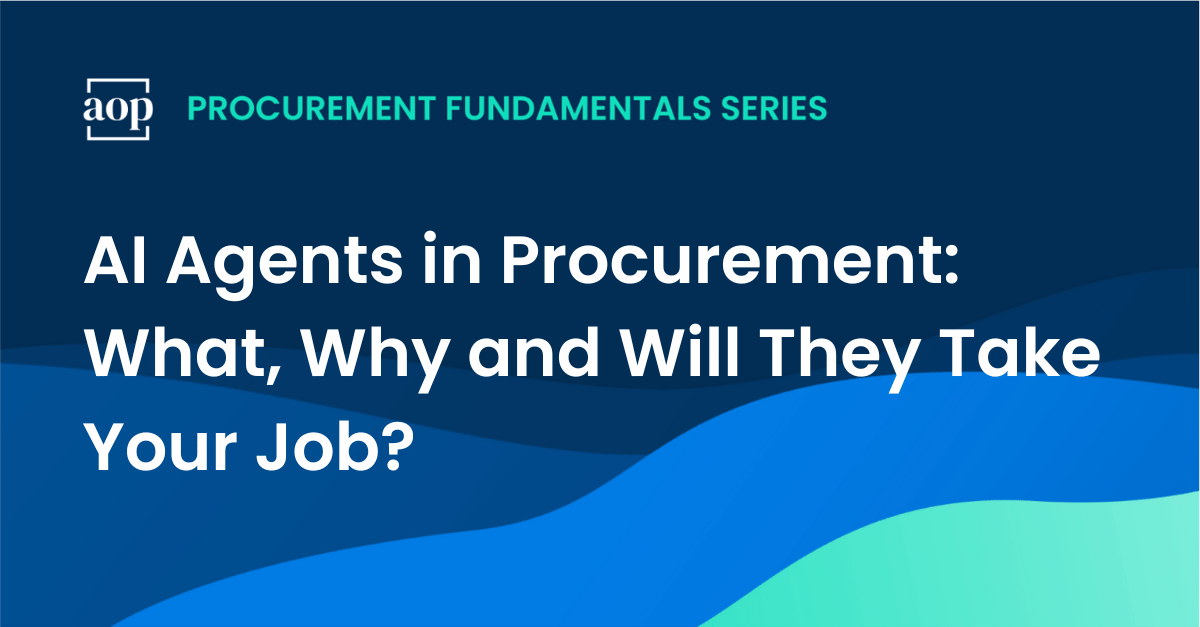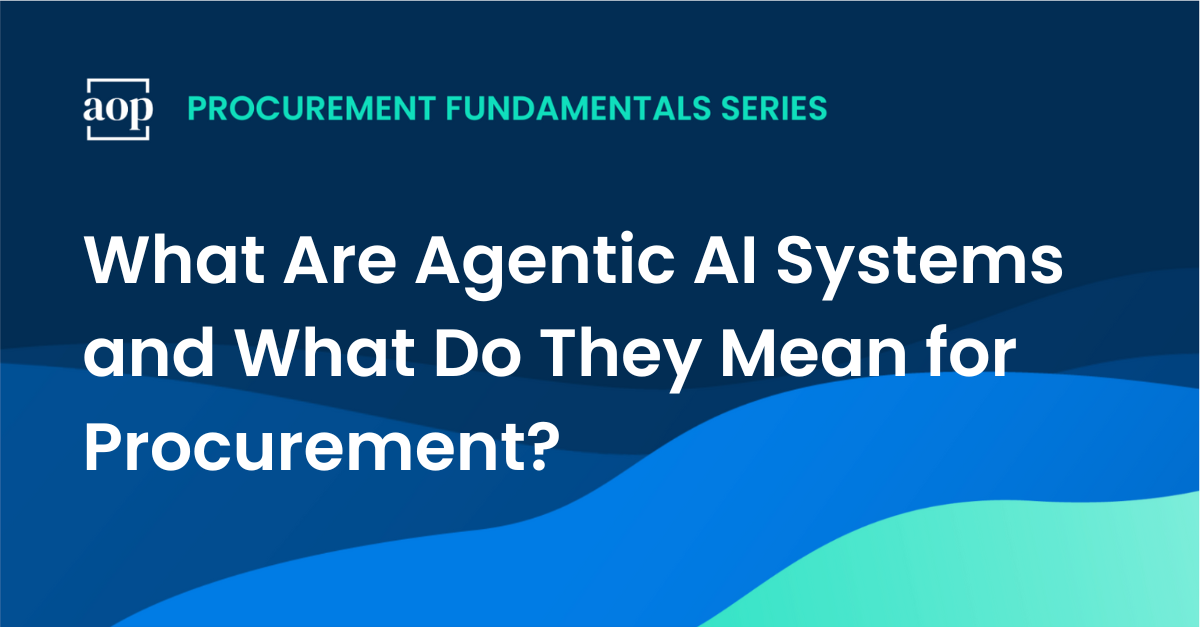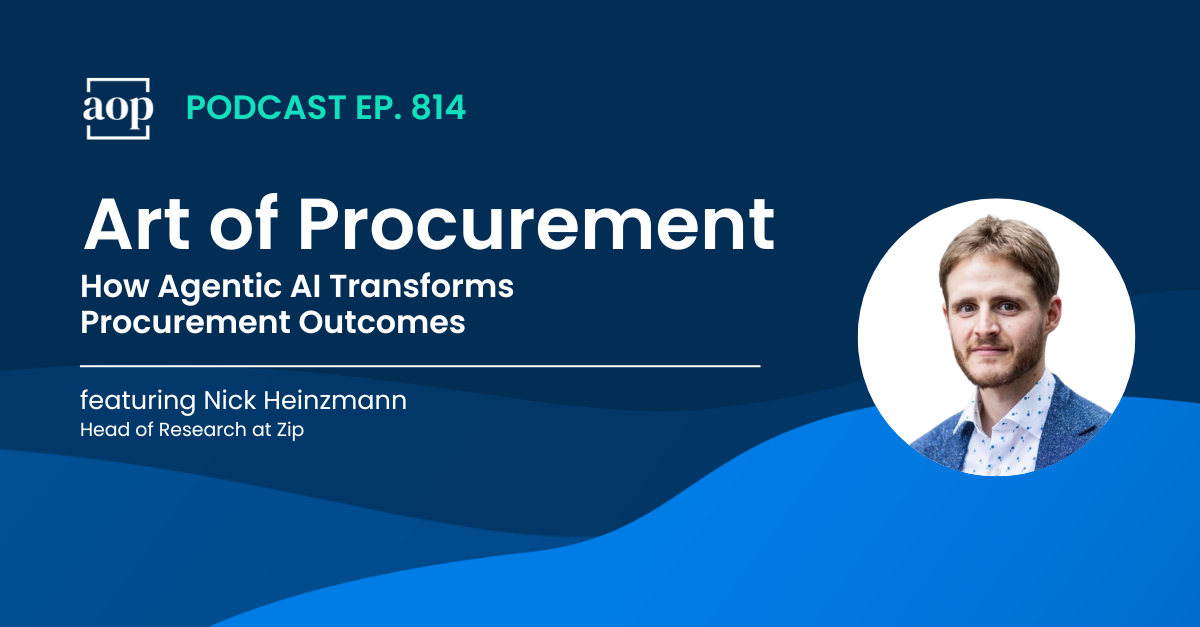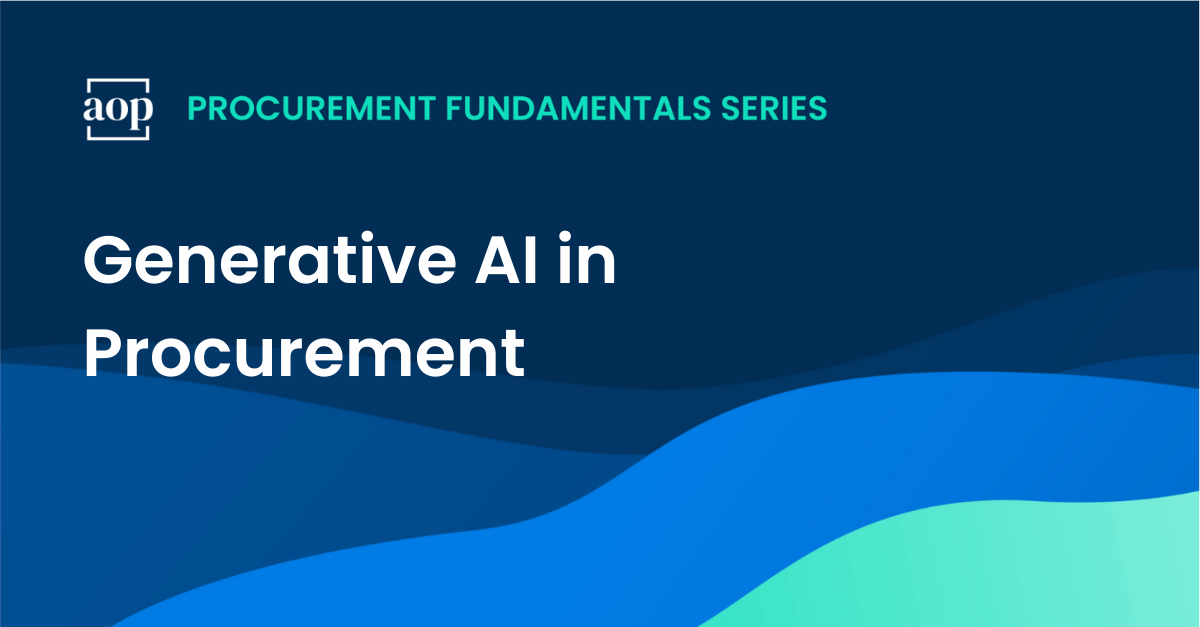6 min read
AI Agents in Procurement: What, Why and Will They Take Your Job?
Philip Ideson : Updated on August 22, 2025

As a procurement professional, you may have heard procurement software providers promoting Agentic AI solutions, promising to automate your most mundane tasks and reduce manual work in your procurement team. But what exactly are AI Agents, and will they take your job?
AI Agents are a very new form of technology and their long-term impact in the workplace is still unclear. It’s unlikely that procurement professionals will be fully replaced by AI Agents, but procurement professionals who use AI Agents may have an advantage over professionals who don’t use them.
Let’s go through what AI Agents are and how they have started to impact procurement jobs.
AI Agents simply explained
An AI Agent is an autonomous software system that perceives its environment, makes decisions, and takes actions to achieve specific goals without requiring constant human direction. Unlike traditional AI models trained for specific tasks, AI Agents can perform multiple tasks simultaneously and adapt their approach based on changing conditions.
Think of AI Agents as enthusiastic research assistants who possess extensive knowledge but need clear direction and oversight from experienced professionals. They can work around the clock, processing information and taking action within the parameters you establish, but they still need your active guidance to bring meaningful impact to your everyday work.
How an AI Agent works
AI Agents are built upon Agentic AI software systems. These can be either embedded into a tool or platform you already use, or you can build one yourself using workflow automation software such as N8N, make.com, or Zapier.
There are five aspects of AI Agents that set them apart from other AI systems:
1. AI Agents have autonomy to set goals
AI Agents have autonomy to interpret your goals and take action. You define clear objectives like "maintain optimal inventory levels" or "reduce category spend by 10 percent." The agent then operates independently within this framework, making decisions and taking actions to achieve these goals.
2. AI Agents can observe their environment
AI Agents can observe their environment, for example, by accessing the internet or your key procurement systems. They can monitor both internal data - spend patterns, contract terms, supplier performance metrics - and external factors such as market conditions, supplier news, and risk indicators. This constant monitoring enables proactive responses to changing conditions.
3. AI Agents have reasoning capabilities
AI Agents exhibit advanced reasoning skills. They can simulate logical thinking with business rules to evaluate multiple options simultaneously. In the context of procurement tasks, the agent considers factors like price, quality, delivery time, supplier reliability, and compliance requirements - processing far more variables than humans can quickly assess.
4. AI Agents can interact with other systems
Many AI Agents can interact with other software systems to automate tasks, reference databases, or retrieve information. In procurement, this can mean automatically soliciting quotes from pre-approved suppliers, evaluating bids, and awarding business based on predefined criteria.
5. AI Agents can learn independently
AI Agents analyze outcomes to improve future decisions. This can result in prescriptive recommendations or suggested next-step actions. If certain suppliers consistently outperform others, the agent can provide recommended next step actions. If specific negotiation strategies prove more effective in certain situations, it can suggest changes to your sourcing strategies.
AI Agents still need humans in the loop
Despite their increased autonomy, AI Agents still require human oversight. People need to set objectives and maintain accountability even as the AI agent executes tactics. The agent operates within guardrails that humans establish and escalates decisions that fall outside its parameters set out in your AI governance framework.
How AI Agents are different from other solutions
AI Agents can be compared to generative AI chat tools and robotic process automation (RPA) solutions - however, these solutions fundamentally work in different ways. Most generative AI solutions respond when you ask questions. RPA follows predetermined steps you have configured. AI Agents work toward goals, making intelligent decisions and adapting their approach without waiting for constant input.
|
Characteristic |
Gen AI Chat |
RPA Bots |
AI Agents |
|
Trigger |
Human prompt |
Pre-set rules |
Defined goals |
|
Adaptability |
Limited |
None |
High |
|
Decision logic |
None |
Deterministic |
Probabilistic + rules |
|
Human role |
Interact over chat |
Configure & handle exceptions |
Set goals & oversight |
The key difference between AI Agents and other solutions comes down to autonomy and adaptability. Traditional workflow automation systems break down when they encounter unexpected scenarios. AI Agents adapt and find alternative approaches, making them ideal for procurement's dynamic environment where exceptions and changing conditions are common.
State of AI Agents in procurement
Many procurement leaders express strong interest in AI Agents, but the current implementation landscape tells a different story. According to recent research shared in the 2025 Annual ProcureCon CPO Report, 90 percent of CPOs are considering AI Agents and 82 percent have identified specific use cases, but widespread deployment remains limited across most procurement organizations.

According to the above referenced report, most organizations are still in the experimental phase, with AI Agents handling simple, rule-based tasks rather than the complex, autonomous decision-making capabilities that define true agentic AI. This implementation gap reflects the challenges identified by respondents, including integration issues, data quality concerns, and the need for more sophisticated change management approaches. The fact that only 27 percent of respondents express high confidence in their teams' AI capabilities, while 65 percent remain only somewhat confident, underscores that while investment appetite is strong, operational readiness and widespread deployment lag significantly behind strategic intentions.
Real-world applications of AI Agents in procurement
Today's AI agent applications in procurement are primarily concentrated in pilot programs and narrow use cases in areas such as automated spend analysis, basic supplier risk monitoring, and routine purchase order processing for low-risk categories. Looking ahead, there are a number of promising transformational applications for AI Agents in procurement.
Autonomous sourcing and purchasing
For commodity items and standard services, AI Agents manage the entire sourcing process. They automatically solicit quotes from pre-approved suppliers based on demand forecasts or inventory levels, evaluate bids using predefined criteria, and award business to optimal suppliers. The agent can even handle routine negotiations within preset parameters, such as seeking better terms when a supplier's quote exceeds budget by less than 5 percent.
Proactive supplier risk management
Risk monitoring represents one of the most valuable applications. AI Agents continuously track supplier KPIs including on-time delivery rates, quality metrics, and financial stability indicators. They monitor external news sources for potential disruptions and take immediate action when risks emerge. If a supplier's shipment faces delays due to a port strike, the agent automatically sources alternative suppliers and adjusts delivery schedules.
Intelligent contract compliance
Contract management becomes automated as AI Agents monitor spend against contracts in real-time, automatically flagging off-contract purchases or invoice violations. They track contract terms and renewal dates, triggering renegotiation processes before contracts expire and ensuring compliance with preferred supplier agreements.
Streamlined purchase-to-pay
When employees submit purchase requests, AI Agents automatically check budget availability, select appropriate catalog items or suppliers, and generate purchase orders. They route requests to humans only when unusual conditions are detected or approval thresholds are exceeded, dramatically reducing processing time.
In the long term, AI Agents have the potential to influence most of the work done in a procurement organization. Whether you will interact with one or more agentic AI systems is unclear. It’s likely that most procurement professionals will have a wide range of agents available to help with different aspects of their day-to-day work.
Impact of AI Agents on procurement jobs
The introduction of agentic AI will most likely transform procurement jobs rather than eliminate them. Many experts believe the biggest impact will come through the automation of manual and repetitive tasks.
According to a recent estimate from Bain & Company’s report, “Ready, Set, Go: AI is Poised to Automate Procurement”, the repetitive tasks that fill a procurement professional's typical nine-hour workday could shrink to less than one hour with AI-enabled workflows, leaving more time for strategic work.

If AI Agents are capable of automating most manual tasks, procurement professionals have more time for strategic work. Category managers can focus on strategy instead of data gathering and report generation. Buyers can concentrate on complex negotiations and relationship building rather than routine purchase processing. Analysts can shift from report generation to insight interpretation and strategic recommendation.
The future procurement professional as AI orchestrator
You can view tomorrow's procurement professional as an AI orchestrator, managing multiple specialized agents while focusing on strategic value creation. Consider a category manager overseeing five specialized agents:
- A market intelligence agent continuously monitoring supplier markets and pricing trends
- A contract compliance agent ensuring all spend follows negotiated terms
- A risk monitoring agent tracking supplier financial health and disruption signals
- A negotiation prep agent preparing detailed materials with competitive intelligence
- A performance analytics agent measuring category performance and identifying improvement opportunities
This agent portfolio enables one person to manage far more complexity and volume than traditional approaches allow. The human orchestrates the agents, sets priorities, and handles tasks requiring judgment, creativity, or relationship management.
How AI and human intelligence can work together
Success in the AI agent era requires understanding the complementary strengths of humans and artificial intelligence. AI excels at processing data, identifying patterns, and executing routine tasks consistently without getting tired or making calculation errors.
Humans excel at strategic thinking, creativity, relationship building, and ethical judgment. Complex negotiations requiring cultural understanding, trust-building with suppliers, and decisions that must be made with incomplete information remain distinctly human capabilities.
Organizations embracing AI Agents may operate with smaller procurement teams managing larger spend volumes while making faster, more informed decisions. The focus will shift from transaction processing to value orchestration, with procurement professionals spending more time on supplier innovation partnerships, strategic sourcing initiatives, and cross-functional collaboration.
How you can prepare for agents in your team
To prepare for this transformation, start by assessing your current processes for automation opportunities, particularly those involving routine, rule-based decisions. Develop governance frameworks that establish clear boundaries and escalation procedures for AI Agents. Begin with pilot programs in low-risk, high-volume areas where you can measure impact and refine your approach.
Most importantly, invest in team training and change management to help your organization adapt to new ways of working. The future belongs to organizations that embrace AI Agents not as replacements for human expertise, but as powerful tools that amplify their unique capabilities.
Bottom line on AI Agents in procurement
The question isn't whether AI Agents will transform procurement - it's how quickly your organization will adapt to this change. Start by identifying your most repetitive, rule-based processes and consider how an AI agent could handle them autonomously while you focus on strategic value creation.
Remember, we’re still in the early days of AI Agents in procurement. Be curious about the opportunities presented by software solution providers, but be realistic about the time it will take to significantly change your ways of working.






